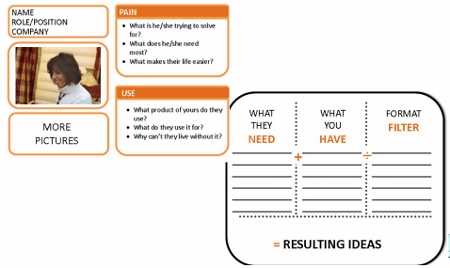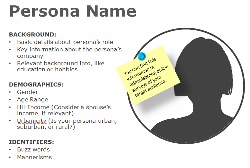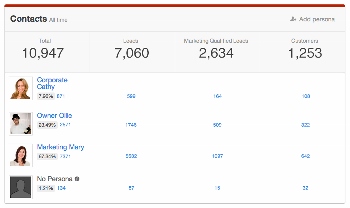
Do you embrace personas for your business? They're effective if you're looking for better customer engagement to drive more business, and should be part of your marketing efforts.
If you're looking for a reason to focus on customer personas for your business, I recommend that you read Everything that's wrong with retail summed up in one question. The article makes a strong case for personas as a means for connecting with profitable customers.
Granted, the article focuses on retail. However, it applies to all businesses including a small business. Here's why.
What is a Persona?
A persona consists of a fictional generalized representation of your ideal customers based on what you know about them. This can include quantitative and qualitative research, observation, and your own experience so you can build a picture of ideal and less ideal customers and determine how best to meet their business needs. That picture can include details such as:
- Demographics
- Role in the business (including decision-making power)
- Goals and responsibilities
- Communication preferences
- How that person will consume your product/service
- Challenges, frustrations, and needs
- Expectations
Personas also allow you to determine if some customers are wrong for your business. For example, if your business sweet spot is small and medium-sized businesses (i.e., SMBs), you may prefer to avoid large enterprise-sized companies. You might, then, create a negative persona to capture those prospects.
In other words, a buyer persona allows you to be thoughtful and deliberate about prospects so you can efficiently improve the likelihood of successful relationships.
How Do You Create Personas? 3 Steps
The persona creation process includes these three steps.
Step 1. Listen Intensely to Your Customers
When you build buyer personas, start by doing user research and listening intensely to existing customers - good ones, so-so ones, and less ideal ones.
Listen through in-person interviews, casual interactions, via your sales and customer service representatives as well as through written communications and online comments.
Review any analytics data and market research you have available. Look for clues to help guide what problems prospective customers want to find solutions for: what words do they use, what frustrations do they have, and what benefits will they see from the solution?
Think through questions such as:
- What makes an ideal customer?
- How do you know when a potential customer becomes a dud?
- Which of these customers should be target personas, and which should be avoided?
Step 2. Build a Picture of Your Customers
Use what you've learned to build a picture of your customer groupings from the perspective of a buyer persona.
In the process, detail any relevant demographics. You can personalize the picture with a representational photo of that customer segment.
Describe what role she might hold at an organization. Document what pains your prospect faces; find out what she's trying to solve and what she values, as well as how your product or service fits into her life. List specific questions that she might ask.
This picture you're building captures what you've learned about your distinct customer groupings, who they are and how they make decisions. The better you understand the world of your customer prospects and personas, the better you will be able to meet their needs throughout the purchase process.Below you see a quick template to get you started thinking about different business personas.
.jpg)
You're looking to find pockets of commonality and patterns that you can replicate. You don't need a zillion distinct personas. Rather, you want as few as make sense for your world; and those few different personas should truly be unlike one another.
My business has two distinct personas:
- The busy decision-maker who's trying to plan for the future
- The marketer wearing too many hats
Step 3. Name Your Individual Personas
Giving a representative name to your persona means that whenever you use that name, everyone in your organization - including your marketing team - will understand the reference. (Okay, that assumes that you involve everyone in the process.)
A name creates a short cut that you can use internally to focus your organization on a specific persona very quickly. Here are persona examples: BuildDirect refers to Bob the Builder; HubSpot has used Marketer Mary and Enterprise Erin - among others.
>> See How To Develop a Buyer Persona for Content Marketing
>> See Developing Marketing Personas for Content Marketing

Business Persona Tools and Templates
You'll find available online many helpful tools and persona templates to help you build your personas. Here are a few:
>> From HubSpot, How to Create Detailed Buyer Personas for Your Business [Free Persona Template]
>> How to Build Your Target Buyer Persona (with Free Template)
That said, sometimes tools and templates can be paralyzing. If that's the case for you, start in a low-key manner and be practical.
HubSpot, Marketing Personas, and Context Marketing
If you use HubSpot, you'll find a persona tool fully integrated into the software for use in inbound marketing campaigns and forms so visitors can self-select their buyer persona.
>> See Do You Integrate Personas into Your Inbound Marketing with HubSpot?
Another useful feature you'll find available with HubSpot is being able to use personas in context marketing. In other words, depending on the customer type that a visitor to your website selects - via a form, or by selecting a specific button on the page, you can customize the journey through your website based on that choice.
- Perhaps that person primarily consumes your content on a mobile device. You can customize the experience accordingly by removing images.
- What if one persona is only interested in one aspect of your business and another in a completely different one? For example, gluten-free choices vs. sugar-free? A homeowner vs. a small business owner? A medical professional vs. a legal one? A flower-lover vs. a succulent fan.
>> Read How Contextual Marketing Can Make Meaning For Your Customers
In other words, once you understand your profitable users and buyers, you can better serve them.

What's the Value of Personas in Business?
Going back to the retail example that originally inspired this article, let's explore the value that personas brought to that business in understanding the target audience.
Profitable Persona vs. Bargain-Hunter Retail Persona
The article describes a conflict between focusing on a business' most profitable customers [i.e., those who pay full price] and bargain hunters [i.e., who wait for sales].
Despite a rational response that a business is better off focusing on profitable customers [i.e., an important persona], many focus on bargain hunters [i.e., a minor persona].
As the article states:
"... everything that's wrong in retail today. We're willing to ignore the needs and interests of our most profitable customers to cater to people who don't really value what we have to offer and won't buy unless we offer them a discount...."
The end result for customers is schizophrenic and reinforces a focus on bargains. What goes through customers' minds is a variation on:
-
This retailer hasn't made an effort to understand customers, especially loyal ones.
-
This retailer can't be trusted to be consistent in its product pricing.
-
This retailer believes customers are fools and can be taken advantage of.
-
Customer says: "I will not be taken advantage of, oh untrustworthy retailer!" and proceeds to bargain hunt all s/he can. After all, when businesses aren't trusted, price becomes the primary decision factor.
Imagine if that bargain hunter-focused retailer had fully understood and embraced that a specific customer persona [i.e, non-bargain hunters] represents the business's primary source of revenue and profitability. The result would have meant banishing forever the constant sales events and promotions. The bargain hunter would be discouraged and the profitable customer made to feel appreciated!
Here's an example of one retail business that does: Nordstrom's, aka The Retailers' Retailer. I'm willing to bet that Nordstrom has developed detailed customer personas.
BTW - have you noticed how those retailers trying to be all things to all customers have mostly gone out-of-business?

What About Personas for Non-Retail Business?
Whether you're in retail or another industry, personas play an important role in marketing your company and developing a marketing strategy for your business.
Whether you focus on a user persona or a customer persona, knowing who your target customer is means that you can be precise and specific in your communications and actions.
Personas allow you to improve the customer experience. By focusing in on your target audience, and understanding every aspect of the customer journey, you can develop educational content for your specific personas, remove roadblocks, answer relevant questions, and generally delivery a friction-less process.
This is particularly valuable given the important role that your digital marketing presence plays. After all, your website and blog are your 24/7 sales and marketing associates, enabling your prospects to educate themselves about your company, your people, and your solutions.
From a marketing perspective, that means having content that answers the questions your primary persona has.
For your sales team, an educated prospect means a better qualified real person who is likely to become an actual customer, and ready to make a purchasing decision.

The Case for Personas in Business
Do you feel that there's a case for personas in your business? Can you see thinking about your current customers and figuring out how they are similar and different so you can be more effective in your marketing and sales?
Companies that have find that they can better engage with their ideal prospects.
- Personas require that a business accept that it cannot be all things to all customers.
- Personas enable a business to focus consistently on who's important without being distracted by minor players. They force the business to stay focused.
- With personas, a business commits resources to fully understanding customers' relevant pain points and needs.
- Thanks to personas, businesses learn to be consistent in their content, communications, policies, pricing...
- Ultimately, personas enable businesses to develop stronger bonds with customers.
Although my example comes from retail, this situation plays itself out across many industries on a regular basis - B2B as well as B2C - whether you focus on a marketing persona, an audience persona, a buyer persona, or multiple personas (just not too many!).
Why not embrace personas for your business? You might be surprised by the relationships you develop with your customers.
Let me know.
Thanks for reading!









